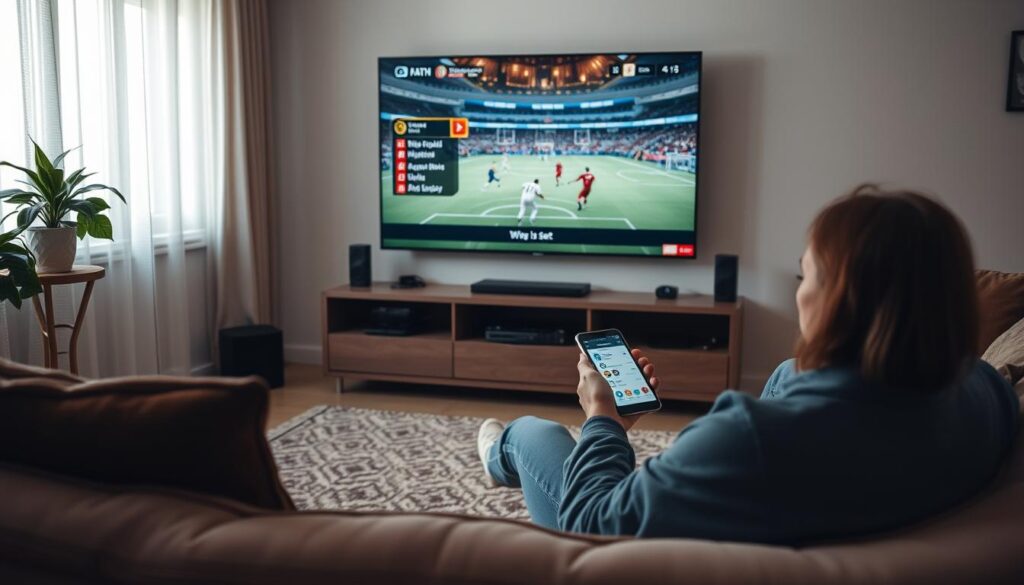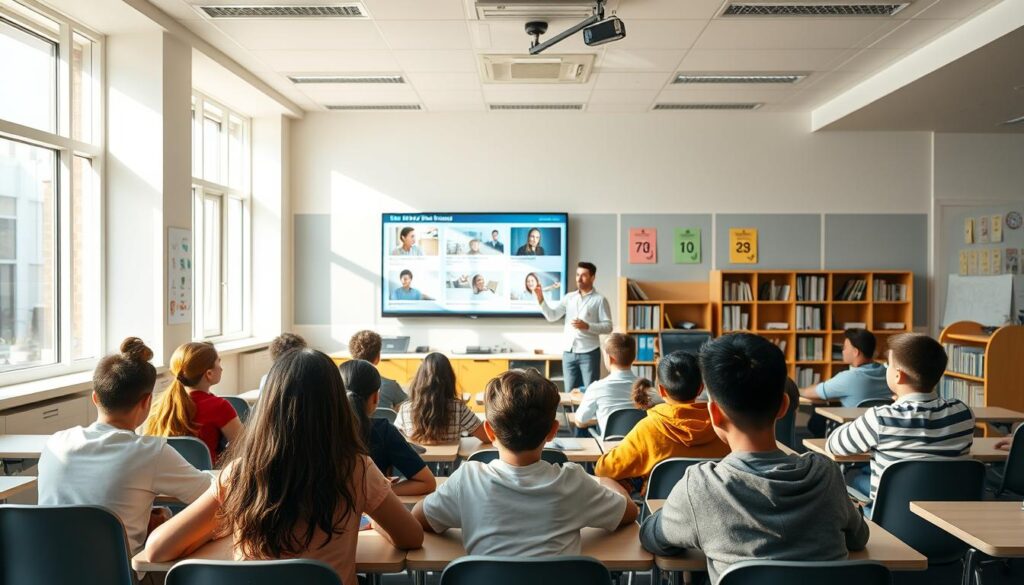Did you know watching sports in the original language can really help you learn a new language? With IPTV, you can watch international sports channels. This lets you dive into real language and culture.
Watching live sports can make your listening skills better. You’ll learn new words and get used to different accents. IPTV education is a fun way to learn a language.
Try IPTV for free now. You get 1 month of top streaming for just $6.95 at https://GetMaxTV.com. It’s a great way to make your language learning more exciting.
Key Takeaways
- IPTV gives you access to international sports channels for learning languages.
- Watching sports in the original language boosts your listening and vocabulary.
- IPTV offers a deep dive into language learning.
- Try IPTV with a free trial to boost your language skills.
- IPTV education is a unique and engaging way to learn a language.
What is IPTV and How Does it Benefit Education?
IPTV, or Internet Protocol Television, lets users stream TV over the internet. It has changed how we watch media. Now, we can enjoy many channels and shows anytime, anywhere.
Understanding IPTV Technology
IPTV uses the internet to send TV content, unlike old satellite or cable TV. This gives a more personal viewing experience. Users can watch on devices like phones, tablets, and smart TVs.
In education, IPTV is very helpful. It offers lots of educational content, like documentaries and language learning channels. For example, students can watch shows in their original language. This helps improve their language skills by immersing them in the language.
The Role of IPTV in Modern Learning
In today’s learning, IPTV is key. It provides a variety of content for different learning styles. It helps make hard concepts easier to understand by using visuals and sounds.
Also, IPTV lets students access content not available locally. They can watch programs from all over the world. This gives them a chance to learn about different cultures and views.
To learn more about IPTV and language learning, visit this page.
Key Advantages of Using IPTV in Education
Using IPTV in education has many benefits. It offers a wide range of educational content. It also lets students learn at their own pace and from anywhere.
- Access to diverse educational content
- Personalized learning experience
- Flexibility in accessing content
By using IPTV, schools can make learning more engaging and effective. As the world connects more, IPTV’s role in education will grow. It will open new doors for learners everywhere.
Enhancing Language Skills with IPTV
IPTV opens a world of languages and cultures for learners. It offers many international channels. This lets users watch content in different languages, making learning more fun.
Watching International Channels in Original Languages
One big plus of IPTV is watching foreign sports and shows in their real language. This is great for language learners. They get to hear real language, accents, and cultural details.
For example, a Spanish learner can watch La Liga soccer in Spanish. They can learn from the commentary, player talks, and fan reactions live.

Accessing Cultural Context Through Programming
IPTV teaches languages and shows cultural views of countries. It offers news, documentaries, and shows. Learners get to know cultural practices, traditions, and norms.
This cultural dive is key for learning a language. It helps learners understand the language’s use in real life.
Listening to Native Speakers: A Linguistic Advantage
Listening to native speakers is vital for language learning. IPTV gives many chances to do this. By watching channels in the target language, learners can better their listening skills.
They get used to different accents and learn everyday sayings. This helps with speaking and understanding better.
In short, IPTV is a great tool for improving language skills. It lets learners watch channels in their original language. They also get to know cultural context and listen to native speakers. This makes learning languages and cultures more effective.
The Impact of Sports Programming on Language Learning
Sports programming on IPTV is both fun and educational. It helps learners improve their language skills through engaging commentary and diverse sports content. This mix of entertainment and education makes learning a fun experience.
Engaging with Sports Commentary
Watching sports on IPTV lets learners engage with live commentary. Commentators use idiomatic expressions, specialized vocabulary, and varied grammatical structures. This is great for learners as it shows how language is used in real-time.
“The beauty of sports commentary lies in its ability to convey complex ideas quickly and efficiently, often using colloquial language that native speakers use daily.” This exposure improves listening skills and gets learners used to different accents and speaking styles.
Learning Sports Terminology in Different Languages
Sports terminology is vast and specialized. Watching sports programs on IPTV helps learners pick up this vocabulary in different languages. For example, a soccer match commentary in Spanish can teach learners terms like “fuera de juego” (offside) or “tarjeta roja” (red card).
| Term | English | Spanish | French |
|---|---|---|---|
| Offside | Offside | Fuera de juego | Hors jeu |
| Red Card | Red Card | Tarjeta roja | Carton rouge |
| Free Kick | Free Kick | Tiro libre | Coup franc |
Case Studies: Success Stories in Language Acquisition
Many people have improved their language skills by watching sports on IPTV. For instance, a study found that watching the World Cup in the target language greatly improved listening and comprehension skills.
“Watching sports in the target language was a game-changer for me. I not only learned new vocabulary but also got to understand the culture better.”
These stories show how effective IPTV sports programming can be for language learning. It combines entertainment with education, making learning more engaging and effective.
Choosing the Right IPTV Service for Educational Purposes
Today, there are many IPTV services to choose from. This makes it hard for educators and students to pick the best one for their needs. Each provider has different features and content.
For learning languages through sports, the right IPTV service is key. IPTV services with international channels offer lots of content. This content helps improve language skills and cultural knowledge.
Popular IPTV Providers for Educational Content
Some IPTV providers are known for their educational content. Here are a few:
- IPTV Smarters
- Perfect Player
- GSE IPTV
These providers have many channels and content. They include sports programs in different languages, great for learning.
Comparing Subscription Plans and Features
When looking at IPTV services, check the plans and features. Here’s a comparison:
| IPTV Provider | Monthly Subscription | Channel Variety | Device Compatibility |
|---|---|---|---|
| IPTV Smarters | $10 | Over 10,000 channels | Android, iOS, Windows |
| Perfect Player | $15 | Over 8,000 channels | Android, Windows |
| GSE IPTV | $12 | Over 9,000 channels | Android, iOS, macOS |
User Reviews and Testimonials
User reviews are very helpful. Many say IPTV Smarters is easy to use. It has lots of channels, including sports in foreign languages. This is perfect for watching foreign sports and learning languages.
By looking at these points and doing research, you can find the best IPTV service. It should meet your educational needs and improve your learning.

Integrating IPTV into Classroom Learning
IPTV is changing language education in classrooms. It makes learning more fun and real.
Effective Use in Language Classes
IPTV is great for language classes. Students can watch foreign sports and shows in their own language. This boosts their listening and understanding.
Teachers can:
- Show real-life language materials
- Teach culture through foreign shows
- Get students to talk and analyze in the target language
Exploring Cultural Studies Through IPTV
IPTV lets students see many cultures through TV. It’s perfect for cultural studies.
For instance, watching news, documentaries, or cultural events from around the world. It helps students understand global cultures better.
| Cultural Aspect | IPTV Content | Learning Outcome |
|---|---|---|
| Language | Foreign language TV shows | Improved listening skills |
| Cultural Events | Live broadcasts of festivals | Enhanced cultural understanding |
| Cuisine | Cooking shows from different countries | Appreciation of diverse culinary traditions |
Teacher Training for IPTV Implementation
Teachers need training to use IPTV well. They must learn how to use the technology, pick good content, and plan lessons.
Workshops or online resources can help. They offer tips on using IPTV in class.
By mixing IPTV with old teaching methods, teachers can make learning exciting for students.
Creating a Personalized Learning Experience
IPTV lets learners get a learning experience that fits their needs and skill levels. This personal touch is key for learning a new language. It helps learners focus on areas they need to improve.
Curating Content for Different Skill Levels
IPTV is great for language learning because it lets you find content that fits your skill level. Beginners can find simple content, while advanced learners can find more complex shows. For example, IPTV platforms have many international channels for different skill levels.
By choosing content that interests you, like sports or news, learning becomes more fun. This personalized approach not only improves your language skills but also keeps you motivated.
Setting Viewing Goals and Tracking Progress
Setting goals is important for learning. With IPTV, you can set goals like watching a certain amount of content in the target language each week. You can track your progress in many ways, including:
- Keeping a viewing journal to log progress and reflect on challenging content.
- Using language learning apps that integrate with IPTV services to track comprehension and vocabulary acquisition.
- Engaging in discussions with educators or peers about the content watched.
Interactive Elements and Discussion Opportunities
IPTV also offers interactive learning experiences. Many IPTV services have features like live chats or Q&A sessions during broadcasts. Learners can also join online forums or discussion groups about the content they watch.
“The use of IPTV in language learning not only enhances linguistic skills but also fosters a sense of community among learners.”
Let’s compare traditional learning methods with IPTV-based learning:
| Feature | Traditional Learning | IPTV-Based Learning |
|---|---|---|
| Content Variety | Limited to textbooks and classroom materials | Access to a wide range of international channels and content |
| Personalization | One-size-fits-all approach | Tailored content selection based on learner’s skill level and interests |
| Interactivity | Limited interaction, mainly through classroom discussions | Real-time interaction through live chats, Q&A sessions, and online forums |
By using IPTV for language learning, both educators and learners can enjoy a more engaging, personalized, and effective learning experience.
Overcoming Challenges in IPTV-based Language Learning
IPTV brings its own set of challenges for language learning. It offers a unique way to learn foreign languages through sports and other content. Yet, users might face technical problems, poor content quality, and the need to balance screen time with traditional learning.
Technical Issues and How to Troubleshoot Them
Technical problems like buffering and poor video quality are common with IPTV. Start by checking your internet connection speed. Make sure the IPTV app or software is up-to-date. For ongoing issues, reach out to the IPTV service provider’s customer support.
A study found that 30% of users faced technical issues. But, regular updates and user guides helped reduce complaints by 25%. You can learn more about this in the research paper on IPTV’s effectiveness.
Ensuring Quality Content: Avoiding Misinformation
Ensuring content quality and avoiding misinformation is key. Educators and learners should choose reputable sources and channels. When watching foreign sports, commentary and analysis can offer valuable insights. But, it’s important to verify the credibility of sources.
Choosing the right content for IPTV education is essential. Focus on channels and programs that provide accurate information and educational value. This way, learners can benefit from IPTV without exposure to misinformation.
Balancing Screen Time with Traditional Learning
It’s important to balance IPTV with traditional learning methods. Educators can do this by integrating IPTV into a well-rounded curriculum. This includes textbooks, classroom discussions, and writing exercises.
Setting viewing goals and tracking progress can keep learners motivated. Adding interactive elements, like discussions about the content, can also improve the learning experience. This balanced approach makes IPTV a valuable tool in language education.
Success Metrics for IPTV in Education
To see if IPTV works well in schools, we need clear goals. IPTV is great for learning languages, like watching sports in other languages.

Assessing Language Proficiency Gains
One key way to check if IPTV helps is by seeing if students get better at speaking and listening. Studies show that watching foreign sports on IPTV really helps students improve their language skills.
Teachers can compare how well students speak before and after using IPTV. For example, they might watch foreign sports channels to learn a language.
Engagement and Motivation Levels Among Students
It’s also important to see if students enjoy learning with IPTV. Watching sports in another language makes learning fun and interesting.
Teachers can ask students how they feel about IPTV learning. They can also look at how many students join in on IPTV discussions or how often they watch.
“The use of IPTV in our language classes has revolutionized the way we learn. Watching sports in the target language has made the learning process more enjoyable and interactive.”
Gathering Feedback from Educators and Learners
Getting feedback from teachers and students is key to making IPTV learning better. This feedback helps find out what works and what doesn’t.
| Feedback Category | Educators’ Feedback | Learners’ Feedback |
|---|---|---|
| Content Relevance | Appreciation for the variety of international content available | Requests for more diverse sports programming |
| Technical Issues | Concerns about buffering and connectivity | Suggestions for improving the user interface |
| Engagement | Observations of increased student motivation | Positive feedback on the entertainment value of IPTV content |
By listening to feedback, teachers can make IPTV learning even better. This helps students learn more effectively.
Future Trends: IPTV’s Role in Language Education
IPTV is set to become a big player in language education. It’s changing how we learn new languages, making it more fun and hands-on.
Advancements in Streaming Technology
New streaming tech is making IPTV better. It offers clearer streams and more stable connections. This is key for a better learning experience.
Interactive and Immersive Learning Experiences
IPTV can offer interactive and immersive learning. With virtual and augmented reality, learning becomes more engaging. This helps improve language skills.
Global Language Studies Predictions
Experts think IPTV will make learning languages more personal and easy to access. As IPTV grows, it will likely become a key part of language learning around the world. It will make learning with TV a big part of education.
FAQ
What is IPTV and how can it be used for language learning?
IPTV stands for Internet Protocol Television. It lets users watch TV channels and on-demand content online. It’s great for language learning because it offers international channels and content in the original language. This helps improve listening and comprehension skills.
How does watching sports on IPTV help with language learning?
Watching sports in the original language on IPTV introduces learners to sports terms and cultural references. It’s fun and keeps learners engaged.
What are the benefits of using IPTV for educational purposes?
IPTV provides a wide range of content for different learning levels. It offers a personalized learning experience. It also includes interactive elements and discussion opportunities, making learning more engaging.
How do I choose the right IPTV service for language learning?
Look for IPTV services with a variety of international channels and high-quality content. Check if they offer subtitles or language learning tools. Reading reviews and comparing plans can help you decide.
Can IPTV be integrated into classroom learning?
Yes, IPTV can be a valuable tool in language classes. Teachers can curate content, set goals, and add interactive elements. Training teachers is key for successful use.
What are some challenges associated with IPTV-based language learning?
Challenges include technical issues and ensuring content quality. It’s also important to balance screen time with traditional learning. Troubleshooting, verifying content, and setting a balanced routine can help.
How can I measure the success of using IPTV for language learning?
Success can be measured by tracking language skills, student engagement, and feedback. This helps improve the learning experience and make necessary adjustments.
What are the future trends in IPTV for language education?
Future trends include interactive and immersive learning experiences. IPTV will likely evolve, providing new opportunities for global language studies and cultural exchange.
Is IPTV suitable for all language skill levels?
Yes, IPTV can be tailored to any skill level. Beginners can start with subtitled content, while advanced learners can tackle more complex programs.



